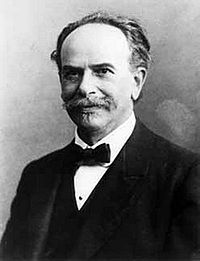Edward Burnett Tylor correspondence in the Pitt Rivers Museum manuscript collections: Part II
Transcription of some of the letters from Box 11a (Franz Boas). These are of relevance to the development of museum anthropology at Oxford. For a full catalogue of all Pitt Rivers Museum manuscript collections see here.
 Franz Boas from his wikipedia entryBoas 10
Franz Boas from his wikipedia entryBoas 10
Coblenz June 27th 1895
Addr. Berlin SW Grossber... 13a
Dear Dr Tylor
I wanted to write to you before this in order to thank you and Mrs Tylor for your kindly hospitality, but I have been too busy. I have written and sent a letter to the Editor of [insert] the [end insert] Nation in regard to the attitude taken by the University of Oxford towards Anthropology, and I hope it may have some effect in the desired direction. ... [1]
Notes
[1] This is a reference to a letter in July 11 1895 edition of 'The Nation' published by the New York Evening Post Publishing Company, Volume 61 (July 1, 1895 to December 31, 1895):
Page 27 Correspondence:
ANTHROPOLOGY AT THE UNIVERSITY OF OXFORD
To the editor of the Nation:
Sir: Anthropology has become one of the acknowledged branches of university studies in America. It is many years since Sir Daniel Wilson introduced the study of it in the University of Toronto. The University of Pennsylvania has long had an anthropological department in charge of Prof. Daniel G. Brinton. At the time of the foundation of Clark University in Worcester the department of Anthropology was established as one of the sub-divisions of the department of Psychology. At Harvard, anthropological instruction has been given for a long time by Prof. F.W. Putnam, and a separate department was founded in 1892. At the same time an anthropological department was introduced at the University of Chicago as one of the subdivisions of the department of Political Science. During the last two years the University of California has established an anthropological department, and Columbia College of New York has included courses of lectures on this subject in its curriculum. In all these universities the science of Anthropology is taught successfully. To these institutions may be added numerous universities of Europe in which Anthropology is taught: first of all Paris, with its École d'Anthropologie; then Rome, Munich, Leipzig, Berlin--to mention the most important schools only.
Notwithstanding these facts, the University of Oxford in Convocation declided the proposed establishment of an anthropological department, on the alleged ground that this science is not capable of being taught! As a matter of fact, Anthropology as a branch of university education was recognized at Oxford in 1883 by the appointment of eminent scholar Dr E.B. Tylor, as a University Reader. In 1883 the University accepted the gift of the Pitt-Rivers collection, and in 1892 appointed a curator. A large collection of material adapted for the teaching of Physical Anthropology was formed by the late Prof. Rolleston, which has been added to since, and is now available for this branch of study. In 1885 Anthropology was admitted as an additional subject in the Final Honour School of Natural Science. This recognition was, however, rather formal than real, as the scope of the subject is too wide for it to be taken as an extra subject. During this time a considerable number of students have attended lectures and profited by the museum collections. The annual expense involved in this mode of instruction amounts approximately to $6,000.
These facts make the attitude of Convocation still more curious. We should expect that the practical bearings of Anthropology, if nothing else, would appeal to the members of the University. The great importance of the study to officers of the colonial service would seem evident. It is their duty to deal with people whose customs and beliefs form the subject-matter of anthropological instruction. Upon their proper treatment depends the welfare of colonists and of aborigines. The University is so blind to these facts that the lack of practical bearings of the study was brought forward as one of the reasons against the establishment of the department. In Holland and in Germany, on the other hand, officers of the colonial service are expected to attend anthropological courses before entering upon their duties.
As a matter of act, opposition to the measure was founded on the deep-seated theological aversion to the scientific study of man. A great many curates were brought in to vote against it, and I am assured that by this means the vote of 68 against 60 by which the proposition was lost, was secured. Thus England is still without an adequate representation of Anthropology in its universities, and Oxford has missed the chance to be the first to take this step, which must be taken, sooner or later, if English universities desire to keep in the ranks with the advance of science. To us the theological opposition is a reminder of bygone times when the results of the study of the manners, customs and beliefs of man were ill understood. The aims of Anthropology are better appreciated in America, and many are the theologians whose contributions to the advance of this science we should be loath to miss.
Franz Boas
London, June 20, 1895.
This letter from Boas, judging by the letter in the PRM ms collections given at the top, was Tylor's attempt to use Boas to publisise the bad decision taken by Convocation which he profoundly disagreed with. As Gosden, Larson and Petch have it [in Rivière, 2007]:
'Tylor led a petition to establish a FHS [final honour school] in anthropology at Oxford, which culminated in 1895, but Convocation rejected his proposal, something he felt bitter about throughout his life. John Linton Myres (1953: 7) remembered that Tylor
resented the rejection of his project for a degree examination in anthropology. It was an unholy alliance he said, between Theology, Literae Humaniores, and Natural Sciences. Theology, teaching the True God, objected to false gods; Literae Humaniores knew only the cultures of Greece and Rome; Natural Sciences were afraid that the new learning would empty their lecture rooms. And the arch-villain was Spooner of New College, whom he never forgave.
Anthropology could only be taken as a special subject within the FHS of Natural Science, and this remained the case for undergraduate teaching until the first intake of Human Sciences undergraduates in 1970. One can speculate as to why anthropology failed to gain final honour school status but part of its failure must be due to Tylor's lack of ability to galvanise support within the University. ... Tylor lacked a college base (common to Readers and professors at this time) until he received an honorary fellowship at Balliol in 1903, wich reduced his ability to link into significant parts of the collegiate University. This might have been significant in his failure to convince the body of college tutors that anthropology was a suitable subject for undergraduate study.' [2007: 28-9]
In compensation, in the same year Tylor's status as one of the father's of British anthropology was acknowledged when 'a statute was approved to establish a Professorship of Anthropology for Tylor, tenable for the duration of his readership'. [2007: 28]
Boas 11
New Brandenburg July 29th 1895
Adr. Berlin S.W. Gross... 13a
Dear Sir,
Enclosed I take the liberty to send you a brief statement regarding the work in British Columbia which I hope will be useful in connection with the intended application for a further grant to the Committee. I have received proof of my report which I hope to return soon.
I have not heard from New York if the Editor of the 'Nation' has printed my letter in regard to Anthropology at Oxford. I think you told me that somebody - a theologian - published a letter in one of the newspapers opposing the proposition on theological grounds. If you could procure a copy of that letter for me I should like to insert a statement [illegible] a translation of the proposed plan of the Department in 'Globus'. I think this might be useful also for the development of matters in Germany.
Yours very truly
Franz Boas
Boas 13
New York 123 West 82nd Str.
June 5th 1896
Prof E.B. Tylor Oxford
Dear Sir,
... I understand from the papers that you have at last carried your point to have anthropology recognized as a special Department. The news gave me [illegible] pleasure and I congratulate you most heartily on your success in overcoming the opposition at the University. ...
Yours very truly
Franz Boas
[It is not known to what Boas is referring, unless it was Tylor's personal appointment as Professor, of which he had misunderstood the significance]
Transcribed by AP January 2013



